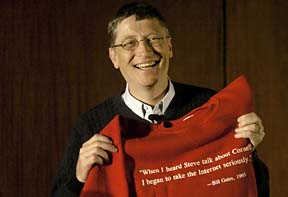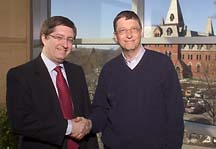Gates sees a software-driven future led by computer science
By Bill Steele

Microsoft Corp.'s Bill Gates sees a future in which technology manages all our information for us, with devices at work, at home and in our pockets all seamlessly linked. The hardware is already here or coming soon, he says, but the challenge is to create the software. And, he says, he needs today's college students to produce it.
On Feb. 26 Gates brought that message to a Cornell audience packed with computer science students in Call Alumni Auditorium of Kennedy Hall. His appearance was part of a whirlwind speaking tour of five colleges.
"I want to share some of my excitement about the impact computer science is having on our lives," Gates began, and he went on to argue that the major developments in technology over the next 10 years will be in software. "Of course," he added, "I'm biased."
Gates, Microsoft's co-founder, who is now billed as the company's "chief software architect," reminded the audience that he started out as a programmer, creating the first interpreter for the Basic programming language that would run on the early Intel 8008 microprocessor. He briefly sketched the history of Microsoft, which began, he said, with the idea that software should be produced by someone outside the company that builds the hardware, to run on many kinds of hardware.
Coming up now, he said, is "a world of many, many devices," from wall-sized displays to gadgets you wear on your wrist. He showed off his Microsoft "smart watch," which, he noted, has 10 times as much memory as the first desktop PC, as well as a prototype of what he called "3D software," a visual representation of a relational database that can link information in many different ways at once. All these devices, he said, should communicate with one another so that a user can have access to the same information at work, at home or at Starbucks, and "the system should have a sense of what you're doing, what interests you, what you care about. You should be able to have exactly what you want when you want it."
The programming challenges for the future, he said, include:
- building a better interface, probably including speech recognition and computer vision, to make computers usable by everyone;
- improving computer security;
- developing AI -- artificial intelligence -- "the ultimate in computer science achievement"; and
- supporting fields of science like astronomy and biology that generate huge amounts of data. "People with computer science backgrounds will be behind many of the advances," Gates said.
Although preaching to the choir, with an audience consisting mostly of computer science majors, Gates argued that a career in computer science would be more interesting than most others, because, "Other fields aren't going to change as much."
During his visit to campus, Gates also met with a panel of Cornell faculty and staff members, who briefed him on Cornell's interdisciplinary program in computing and information science, which is exposing students in many disciplines to computer science, and research in robotics, computational biology and the development of massive databases of scientific information, such as the proposed Library of Life.

Cornell has several important ties to Microsoft. With Microsoft support, the Cornell Theory Center has pioneered the use of multiple processors running the Windows operating system in parallel to form a supercomputer. Microsoft funds a variety of smaller research programs, including work in robotics and human-computer interaction. Fred Schneider, Cornell professor of computer science, is chair of a panel of experts advising Microsoft on ways to improve the security of its products. And 50 undergraduates at Cornell are supported by Microsoft Millennium Scholarships, a program aimed at inner-city youth. Many of those students were present in the Call Auditorium audience, and some used the question period to thank Gates for his help.
In introducing Gates, Cornell President Jeffrey Lehman joked about what some see as a resemblance between them. "All over the world," Lehman said, "people come up to me and say, 'Are you Bill Gates?'" The questions, Lehman said, come because "Gates is known all over the world -- because he has changed the world."
Media Contact
Get Cornell news delivered right to your inbox.
Subscribe